Unit 6 When was it invented? Section A3(Grammar Focus-4c)课件 (共38张PPT)
文档属性
| 名称 | Unit 6 When was it invented? Section A3(Grammar Focus-4c)课件 (共38张PPT) | 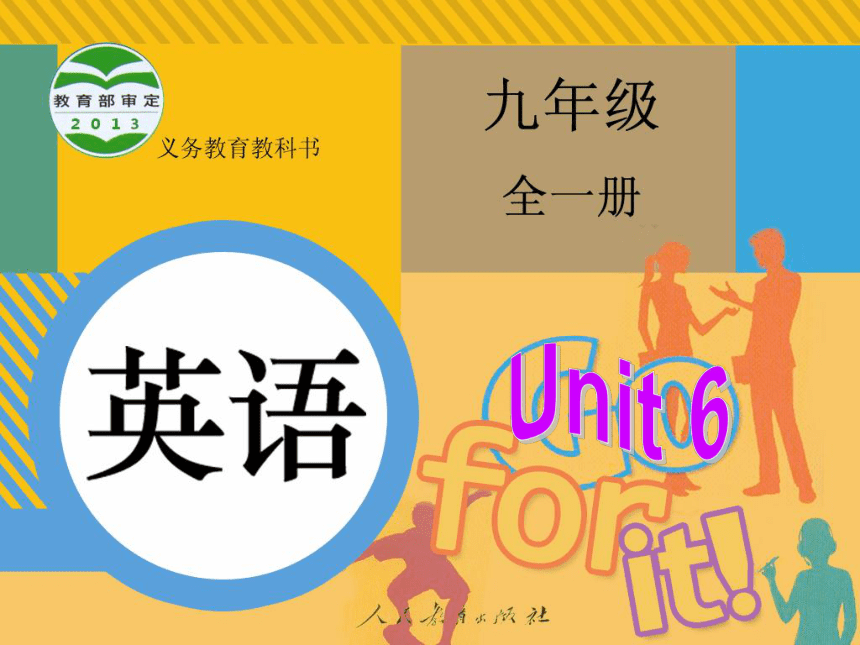 | |
| 格式 | ppt | ||
| 文件大小 | 1.3MB | ||
| 资源类型 | 教案 | ||
| 版本资源 | 人教新目标(Go for it)版 | ||
| 科目 | 英语 | ||
| 更新时间 | 2022-07-01 15:27:52 | ||
图片预览

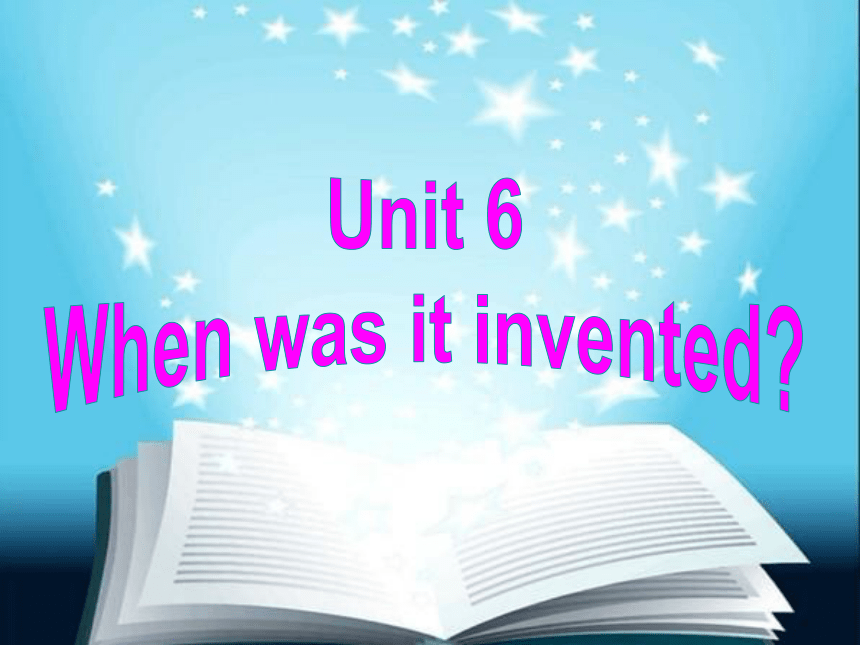

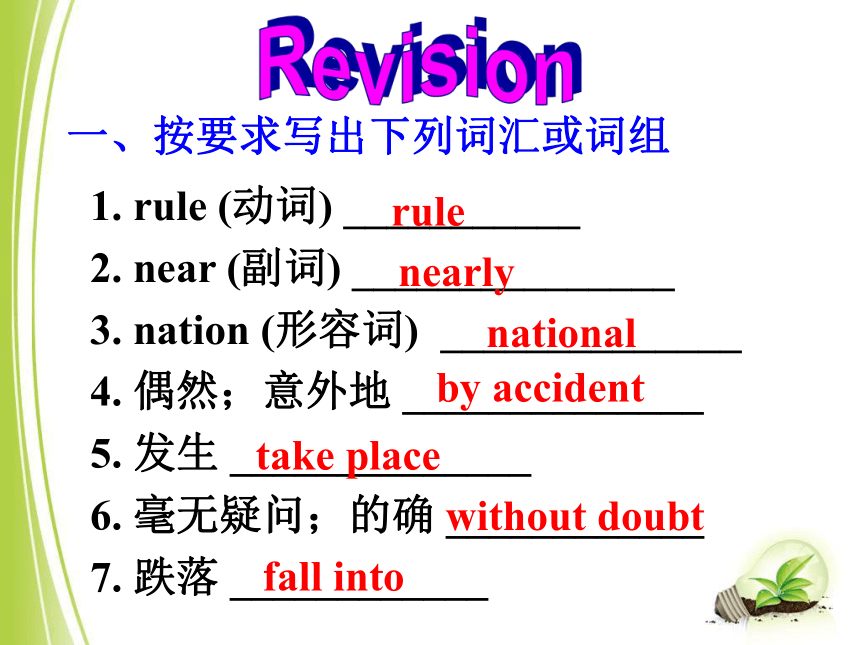
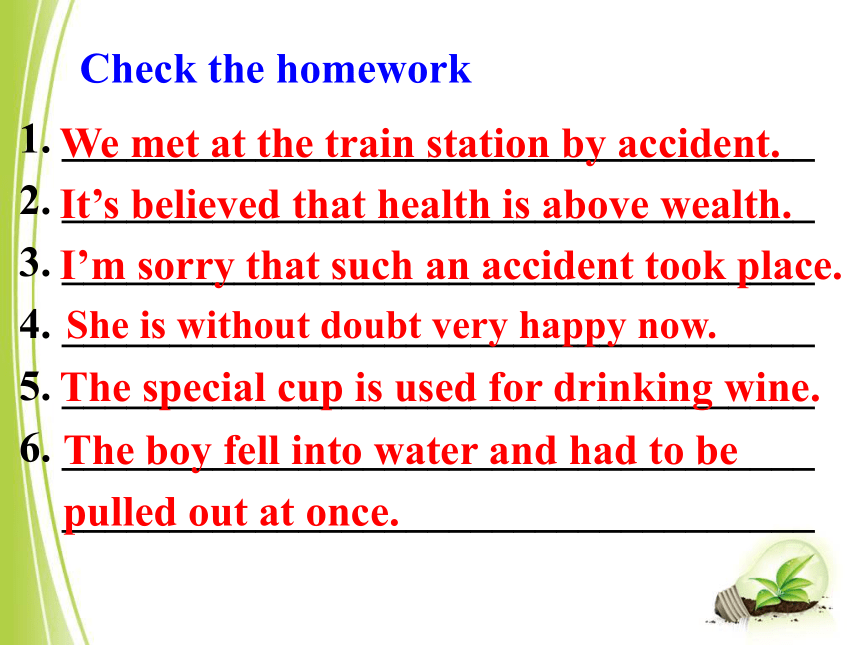
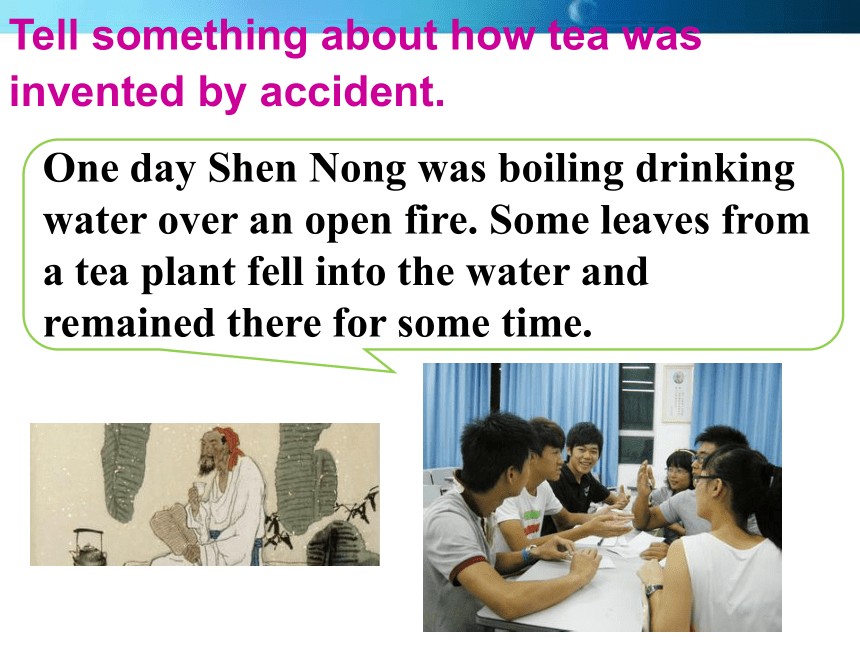
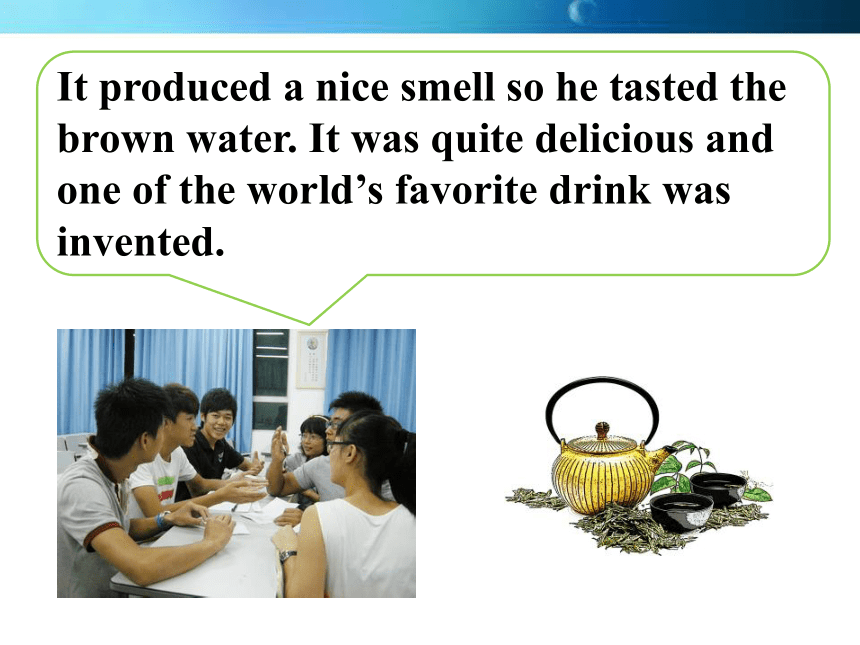
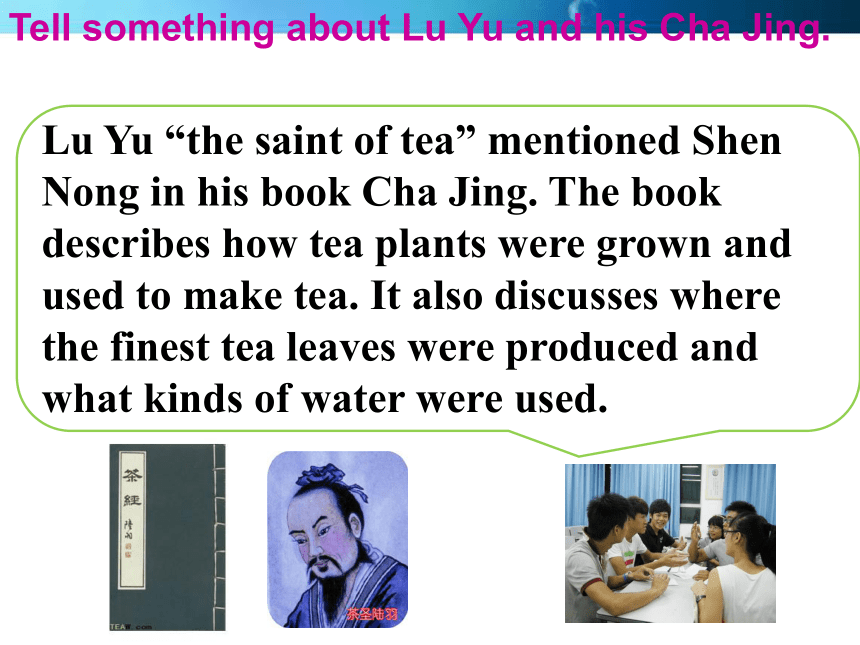
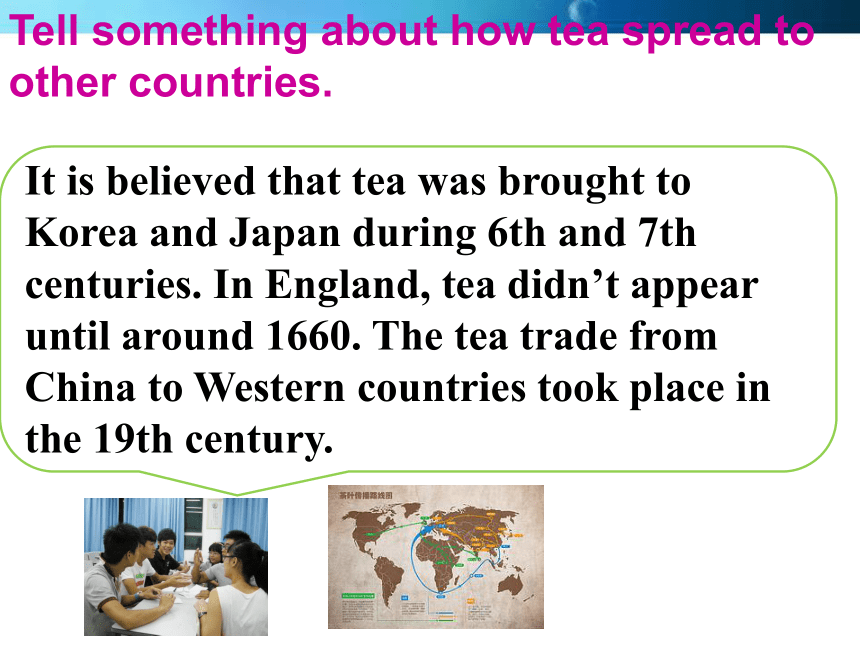
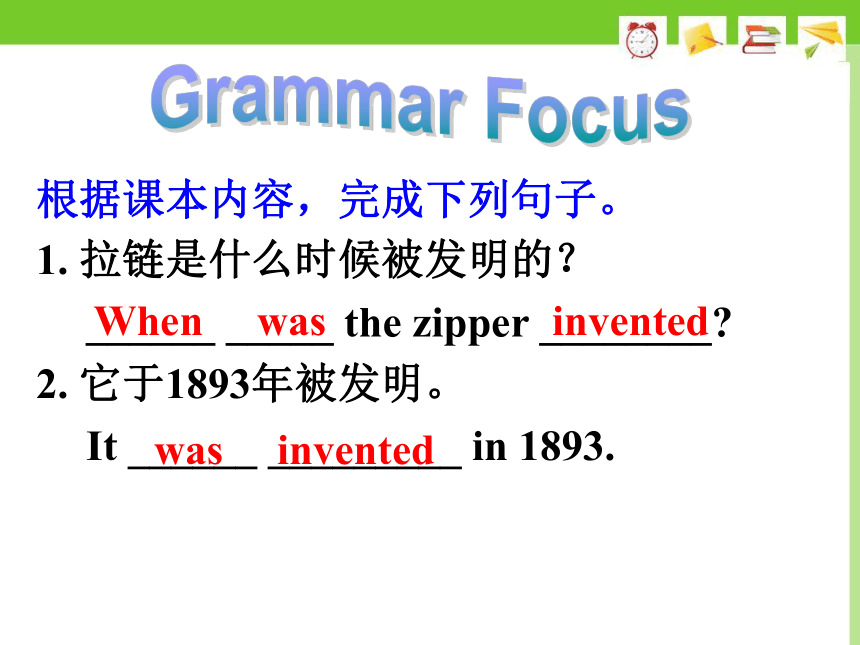
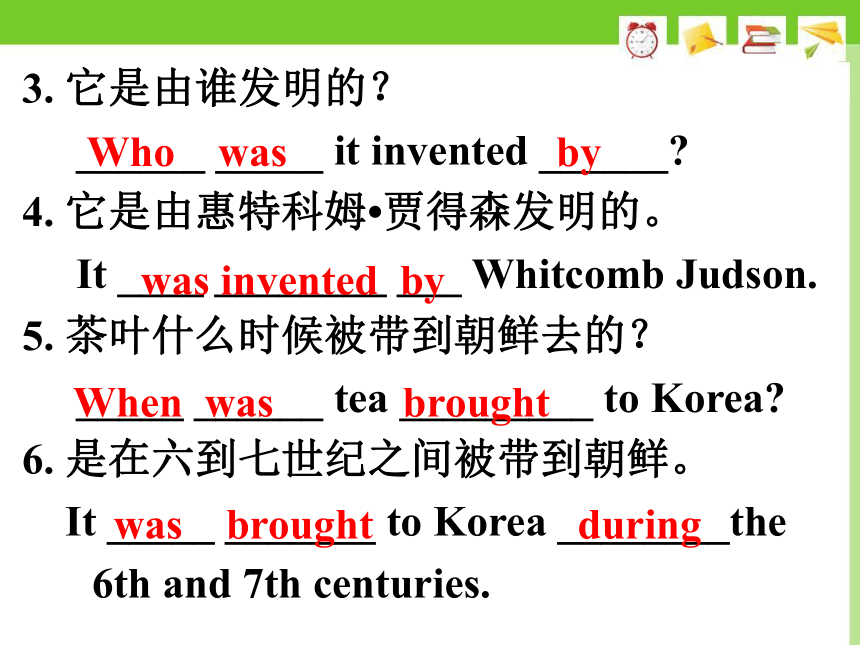
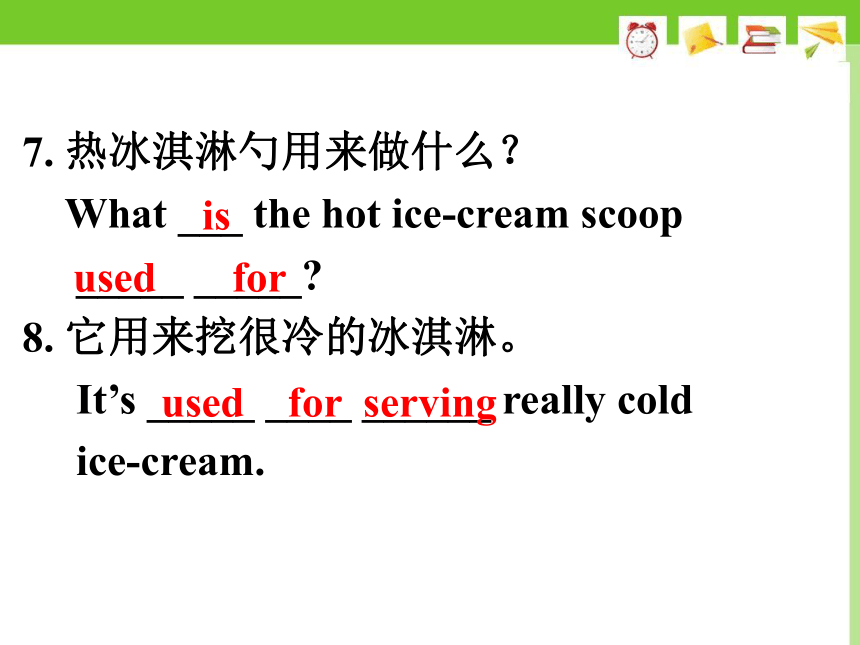
文档简介
(共38张PPT)
1. rule (动词) ___________
2. near (副词) _______________
3. nation (形容词) ______________
4. 偶然;意外地 ______________
5. 发生 ______________
6. 毫无疑问;的确 ____________
7. 跌落 ____________
一、按要求写出下列词汇或词组
take place
nearly
rule
national
by accident
without doubt
fall into
1. ___________________________________
2. ___________________________________
3. ___________________________________
4. ___________________________________
5. ___________________________________
6. ___________________________________
___________________________________
The special cup is used for drinking wine.
It’s believed that health is above wealth.
We met at the train station by accident.
I’m sorry that such an accident took place.
She is without doubt very happy now.
The boy fell into water and had to be pulled out at once.
Check the homework
Tell something about how tea was invented by accident.
One day Shen Nong was boiling drinking water over an open fire. Some leaves from a tea plant fell into the water and remained there for some time.
It produced a nice smell so he tasted the brown water. It was quite delicious and one of the world’s favorite drink was invented.
Lu Yu “the saint of tea” mentioned Shen Nong in his book Cha Jing. The book describes how tea plants were grown and used to make tea. It also discusses where the finest tea leaves were produced and what kinds of water were used.
Tell something about Lu Yu and his Cha Jing.
It is believed that tea was brought to Korea and Japan during 6th and 7th centuries. In England, tea didn’t appear until around 1660. The tea trade from China to Western countries took place in the 19th century.
Tell something about how tea spread to other countries.
根据课本内容,完成下列句子。
1. 拉链是什么时候被发明的?
______ _____ the zipper ________
2. 它于1893年被发明。
It ______ _________ in 1893.
was invented
When was invented
3. 它是由谁发明的?
______ _____ it invented ______
4. 它是由惠特科姆 贾得森发明的。
It ____ ________ ___ Whitcomb Judson.
5. 茶叶什么时候被带到朝鲜去的?
_____ ______ tea _________ to Korea
6. 是在六到七世纪之间被带到朝鲜。
It _____ _______ to Korea ________the 6th and 7th centuries.
was invented by
When was brought
was brought during
Who was by
7. 热冰淇淋勺用来做什么?
What ___ the hot ice-cream scoop
_____ _____
8. 它用来挖很冷的冰淇淋。
It’s _____ ____ ______ really cold
ice-cream.
used for serving
is
used for
9. 贝尔于1876年发明了电话机。
Alexander Graham Bell _________ the telephone in 1876.
10. 电话机在1876年被贝尔所发明。
The telephone _____ ________ _____
Alexander Graham Bell in 1876.
invented
was invented by
英语有两种语态:主动语态和被动语态。主动语态表示主语是动作的执行者,而被动语态则表示主语是动作的承受者。如:
We cleaned the classroom yesterday.
我们昨天打扫了教室。
(主动语态,主语we是clean这一动作的执行者)
The classroom was cleaned yesterday.
教室昨天被打扫。
(被动语态,主语the classroom是clean这一动作的承受者)
一、一般过去时被动语态
一般过去时被动语态的结构为“主语+ was /were +及物动词的过去分词(+by+动作的执行者).”。如:
Trees were planted last spring.
去年春天种了树。
1. 肯定句:
主语+was / were+及物动词的过去分词+其他.
e.g. Paper was invented by Chinese people two thousand years ago.
纸是中国人在二千多年前发明的。
2. 否定句:
主语+ was/were not+及物动词的过
去分词+其他.
e.g. Women were not allowed to take part in the games at first.
开始妇女不允许参加奥运会。
e.g. Was this picture drawn by
your sister
这幅画是你妹妹画的吗?
3. 一般疑问句:
Was/Were +主语 +及物动词的过去分
词+其他
二、被动语态的用法:
1. 不知道谁是动作的执行者,或没有必要指出谁是动作的执行者。
e.g. English is spoken all over the
world. 全世界都在说英语。
2. 需要突出或强调动作的承受者。
e.g. This dictionary is used by most
students.
这本字典是大多数学生在用的。
1. 有些短语动词相当于及物动词,变为被动句时介词或副词不能去掉。
e.g. They put off the meeting because of the weather.
→ The meeting was put off because of the weather.
会议因天气的缘故被推迟了。
三、主动语态变被动语态应注意的问题
2. 含有双宾语的主动句变为被动句时,
通常把指“人”的间接宾语变为主语,
指“物”的直接宾语保留不变;如果把
指“物”的直接宾语变为主语,则在间接
宾语前加to或for。
e.g. My aunt gave me an e-dictionary yesterday.
I was given an e-dictionary yesterday.
An e-dictionary was given to me
yesterday.
3. 主动句中感官动词see / hear / watch / feel等和使役动词make / let / have等后跟省略to的动词不定式,变为被动语态时应加上不定式符号to。
e.g. I saw a heavy man enter the house.
A heavy man was seen to enter the house.
4. 系动词、不及物动词或某些短语动词(happen, take place, come true, fall asleep…)没有被动语态。
e.g. What happened to Mr. Brown
布朗先生发生了什么事?
将下列句子变为被动语态。
1. He chose six story books the other day.
Six story books _____ _______ by him the other day.
2. Uncle Lee gave Jack a large cake for he painted the wall wonderfully.
Jack _____ _____ a large cake for he painted the wall wonderfully.
was given
were chosen
3. A mouse ate half of the cake last night.
Half of the cake _____ _____ by a
mouse last night.
was eaten
将下列句子变为主动语态。
4. Were these machines invented by Edison
_____ Edison _______ these machines
Did invent
5. The post card was sent to Linda by Paul.
Paul _____ the post card ___ Linda.
6. America was discovered by Columbus.
Columbus __________ America.
sent to
discovered
对划线部分提问
7. Shoes with lights were used for seeing in the dark.
_____ ______ shoes with lights ______ for
8. Paper was invented in China almost a thousand years ago.
______ _____ paper _________ in China
used
What were
When was invented
4a
Rewrite the sentences using the passive voice.
点拨:原句为一般过去时态,原句的谓语动词为sold,宾语为the fridge;改为被动语态时,应将the fridge作主语,谓语动词用was sold的形式。
1. They sold the fridge at a low price.
The fridge was sold at a low price.
点拨:分析原句的句子结构可知,stole是谓语动 词,my camera是句子的宾语;改为被动语态句时,应将my camera作句子主语,谓语动词用was stolen的形式。
2. Somebody stole my camera
from my hotel room.
_________________________________
_________________________________
My camera was stolen from my hotel room.
3. Where did you take these photos
__________________________________
4. Our parents advised us not to go out alone.
__________________________________
5. Different writers translated the book into different languages.
__________________________________
__________________________________
Where were these photos taken
We were advised not to go out alone.
The book was translated into different languages by different writers.
1. You ____________ to the party last night, weren’t you Why didn’t you go
2. The earthquake happened all of a sudden, but luckily the villagers _____________ to a safe place.
were invited
eat, like, invite, tell, lock, ring, break, bring
were brought
4b
Complete the sentences with correct forms of the verbs in the box.
句子主语you与invite之间存在被动关系。
villagers与bring之间存在被动关系
3. The door ___________ when we arrived, so we ______ the bell.
4. The students ___________ not to eat or drink in class, but Ruby ______ the rule when she started eating a biscuit in science class.
5. The cookies __________ by the hungry kids in less than 20 minutes, and they really _____ them.
was locked
rang
broke
were told
were eaten
liked
the door与lock之间为被动关系;而we与ring之间则为主动关系;其他各题相同。
The telephone ______________ (invent) by Alexander Graham Bell. He __________ (born) in 1847. Mr. Bell ________ (work) on the invention of the telephone with Thomas Watson.
was born
was invented
worked
Decide whether active or passive forms should be used in these sentence. Write the correct forms in the blanks.
4c
the telephone与invent之间存在被动关系;Mr. Bell与work之间是主动关系。
In 1875, Mr. Bell _________ (learn) how to send musical notes through an instrument similar to a telephone. Finally, the telephone _____________ (invent) in 1876. The first sentence that _________ (say) on the telephone by Mr. Bell was “Mr. Watson, come here; I want to see you.” Today the telephone ________ (use) around the world.
learned
was invented
was said
is used
Mr. Bell与learn之间为主动关系。
补全下列主动句变被动句。
1. Jenny put her clothes in the suitcase last night.
Her clothes____ ____ in the suitcase last night.
2. The twins sang an English song that day. An English song ____ _____ ___ by the twins that day.
3. Did they build a bridge here a year ago ____ a bridge ____ here by them a year ago
4. They sold out the light green dresses yesterday. The light green dresses ____ _____ _____ out.
1. rule (动词) ___________
2. near (副词) _______________
3. nation (形容词) ______________
4. 偶然;意外地 ______________
5. 发生 ______________
6. 毫无疑问;的确 ____________
7. 跌落 ____________
一、按要求写出下列词汇或词组
take place
nearly
rule
national
by accident
without doubt
fall into
1. ___________________________________
2. ___________________________________
3. ___________________________________
4. ___________________________________
5. ___________________________________
6. ___________________________________
___________________________________
The special cup is used for drinking wine.
It’s believed that health is above wealth.
We met at the train station by accident.
I’m sorry that such an accident took place.
She is without doubt very happy now.
The boy fell into water and had to be pulled out at once.
Check the homework
Tell something about how tea was invented by accident.
One day Shen Nong was boiling drinking water over an open fire. Some leaves from a tea plant fell into the water and remained there for some time.
It produced a nice smell so he tasted the brown water. It was quite delicious and one of the world’s favorite drink was invented.
Lu Yu “the saint of tea” mentioned Shen Nong in his book Cha Jing. The book describes how tea plants were grown and used to make tea. It also discusses where the finest tea leaves were produced and what kinds of water were used.
Tell something about Lu Yu and his Cha Jing.
It is believed that tea was brought to Korea and Japan during 6th and 7th centuries. In England, tea didn’t appear until around 1660. The tea trade from China to Western countries took place in the 19th century.
Tell something about how tea spread to other countries.
根据课本内容,完成下列句子。
1. 拉链是什么时候被发明的?
______ _____ the zipper ________
2. 它于1893年被发明。
It ______ _________ in 1893.
was invented
When was invented
3. 它是由谁发明的?
______ _____ it invented ______
4. 它是由惠特科姆 贾得森发明的。
It ____ ________ ___ Whitcomb Judson.
5. 茶叶什么时候被带到朝鲜去的?
_____ ______ tea _________ to Korea
6. 是在六到七世纪之间被带到朝鲜。
It _____ _______ to Korea ________the 6th and 7th centuries.
was invented by
When was brought
was brought during
Who was by
7. 热冰淇淋勺用来做什么?
What ___ the hot ice-cream scoop
_____ _____
8. 它用来挖很冷的冰淇淋。
It’s _____ ____ ______ really cold
ice-cream.
used for serving
is
used for
9. 贝尔于1876年发明了电话机。
Alexander Graham Bell _________ the telephone in 1876.
10. 电话机在1876年被贝尔所发明。
The telephone _____ ________ _____
Alexander Graham Bell in 1876.
invented
was invented by
英语有两种语态:主动语态和被动语态。主动语态表示主语是动作的执行者,而被动语态则表示主语是动作的承受者。如:
We cleaned the classroom yesterday.
我们昨天打扫了教室。
(主动语态,主语we是clean这一动作的执行者)
The classroom was cleaned yesterday.
教室昨天被打扫。
(被动语态,主语the classroom是clean这一动作的承受者)
一、一般过去时被动语态
一般过去时被动语态的结构为“主语+ was /were +及物动词的过去分词(+by+动作的执行者).”。如:
Trees were planted last spring.
去年春天种了树。
1. 肯定句:
主语+was / were+及物动词的过去分词+其他.
e.g. Paper was invented by Chinese people two thousand years ago.
纸是中国人在二千多年前发明的。
2. 否定句:
主语+ was/were not+及物动词的过
去分词+其他.
e.g. Women were not allowed to take part in the games at first.
开始妇女不允许参加奥运会。
e.g. Was this picture drawn by
your sister
这幅画是你妹妹画的吗?
3. 一般疑问句:
Was/Were +主语 +及物动词的过去分
词+其他
二、被动语态的用法:
1. 不知道谁是动作的执行者,或没有必要指出谁是动作的执行者。
e.g. English is spoken all over the
world. 全世界都在说英语。
2. 需要突出或强调动作的承受者。
e.g. This dictionary is used by most
students.
这本字典是大多数学生在用的。
1. 有些短语动词相当于及物动词,变为被动句时介词或副词不能去掉。
e.g. They put off the meeting because of the weather.
→ The meeting was put off because of the weather.
会议因天气的缘故被推迟了。
三、主动语态变被动语态应注意的问题
2. 含有双宾语的主动句变为被动句时,
通常把指“人”的间接宾语变为主语,
指“物”的直接宾语保留不变;如果把
指“物”的直接宾语变为主语,则在间接
宾语前加to或for。
e.g. My aunt gave me an e-dictionary yesterday.
I was given an e-dictionary yesterday.
An e-dictionary was given to me
yesterday.
3. 主动句中感官动词see / hear / watch / feel等和使役动词make / let / have等后跟省略to的动词不定式,变为被动语态时应加上不定式符号to。
e.g. I saw a heavy man enter the house.
A heavy man was seen to enter the house.
4. 系动词、不及物动词或某些短语动词(happen, take place, come true, fall asleep…)没有被动语态。
e.g. What happened to Mr. Brown
布朗先生发生了什么事?
将下列句子变为被动语态。
1. He chose six story books the other day.
Six story books _____ _______ by him the other day.
2. Uncle Lee gave Jack a large cake for he painted the wall wonderfully.
Jack _____ _____ a large cake for he painted the wall wonderfully.
was given
were chosen
3. A mouse ate half of the cake last night.
Half of the cake _____ _____ by a
mouse last night.
was eaten
将下列句子变为主动语态。
4. Were these machines invented by Edison
_____ Edison _______ these machines
Did invent
5. The post card was sent to Linda by Paul.
Paul _____ the post card ___ Linda.
6. America was discovered by Columbus.
Columbus __________ America.
sent to
discovered
对划线部分提问
7. Shoes with lights were used for seeing in the dark.
_____ ______ shoes with lights ______ for
8. Paper was invented in China almost a thousand years ago.
______ _____ paper _________ in China
used
What were
When was invented
4a
Rewrite the sentences using the passive voice.
点拨:原句为一般过去时态,原句的谓语动词为sold,宾语为the fridge;改为被动语态时,应将the fridge作主语,谓语动词用was sold的形式。
1. They sold the fridge at a low price.
The fridge was sold at a low price.
点拨:分析原句的句子结构可知,stole是谓语动 词,my camera是句子的宾语;改为被动语态句时,应将my camera作句子主语,谓语动词用was stolen的形式。
2. Somebody stole my camera
from my hotel room.
_________________________________
_________________________________
My camera was stolen from my hotel room.
3. Where did you take these photos
__________________________________
4. Our parents advised us not to go out alone.
__________________________________
5. Different writers translated the book into different languages.
__________________________________
__________________________________
Where were these photos taken
We were advised not to go out alone.
The book was translated into different languages by different writers.
1. You ____________ to the party last night, weren’t you Why didn’t you go
2. The earthquake happened all of a sudden, but luckily the villagers _____________ to a safe place.
were invited
eat, like, invite, tell, lock, ring, break, bring
were brought
4b
Complete the sentences with correct forms of the verbs in the box.
句子主语you与invite之间存在被动关系。
villagers与bring之间存在被动关系
3. The door ___________ when we arrived, so we ______ the bell.
4. The students ___________ not to eat or drink in class, but Ruby ______ the rule when she started eating a biscuit in science class.
5. The cookies __________ by the hungry kids in less than 20 minutes, and they really _____ them.
was locked
rang
broke
were told
were eaten
liked
the door与lock之间为被动关系;而we与ring之间则为主动关系;其他各题相同。
The telephone ______________ (invent) by Alexander Graham Bell. He __________ (born) in 1847. Mr. Bell ________ (work) on the invention of the telephone with Thomas Watson.
was born
was invented
worked
Decide whether active or passive forms should be used in these sentence. Write the correct forms in the blanks.
4c
the telephone与invent之间存在被动关系;Mr. Bell与work之间是主动关系。
In 1875, Mr. Bell _________ (learn) how to send musical notes through an instrument similar to a telephone. Finally, the telephone _____________ (invent) in 1876. The first sentence that _________ (say) on the telephone by Mr. Bell was “Mr. Watson, come here; I want to see you.” Today the telephone ________ (use) around the world.
learned
was invented
was said
is used
Mr. Bell与learn之间为主动关系。
补全下列主动句变被动句。
1. Jenny put her clothes in the suitcase last night.
Her clothes____ ____ in the suitcase last night.
2. The twins sang an English song that day. An English song ____ _____ ___ by the twins that day.
3. Did they build a bridge here a year ago ____ a bridge ____ here by them a year ago
4. They sold out the light green dresses yesterday. The light green dresses ____ _____ _____ out.
同课章节目录
- Unit 1 How can we become good learners.
- Section A
- Section B
- Unit 2 I think that mooncakes are delicious!
- Section A
- Section B
- Unit 3 Could you please tell me where the restroom
- Section A
- Section B
- Unit 4 I used to be afraid of the dark.
- Section A
- Section B
- Unit 5 What are the shirts made of?
- Section A
- Section B
- Review of Units 1-5
- Unit 6 When was it invented?
- Section A
- Section B
- Unit 7 Teenagers should be allowed to choose their
- Section A
- Section B
- Unit 8 It must belong to Carla.
- Section A
- Section B
- Unit 9 I like music that I can dance to.
- Section A
- Section B
- Unit 10 You're supposed to shake hands.
- Section A
- Section B
- Review of Units 6-10
- Unit 11 Sad movies make me cry.
- Section A
- Section B
- Unit 12 Life is full of the unexpected
- Section A
- Section B
- Unit 13 We're trying to save the earth!
- Section A
- Section B
- Unit 14 I remember meeting all of you in Grade 7.
- Section A
- Section B
- Review of Units 11-14
